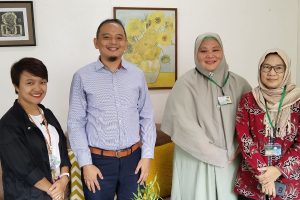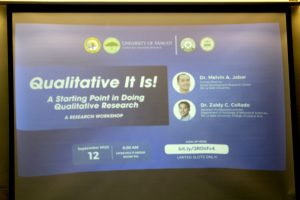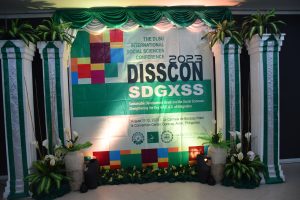SDRC Participates in PIDS-SERP-P Webinar on Information Dissemination and 6th Biennial Meeting
Facts do matter.
 And the extent to which they matter was a talking point in presentations delivered by �������ϲ� Communication Arts associate professor and SDRC research fellow Dr. Jason Cabañes and other panelists during the public webinar entitled “Less Noise, More Facts: Improving Information Dissemination for a Better Normal” held on July 28. The webinar was sponsored by the Philippine Institute for Development Studies (PIDS) and its project Socioeconomic Research Portal for the Philippines (SERP-P) and broadcast via CISCO Webex and Facebook Live.
And the extent to which they matter was a talking point in presentations delivered by �������ϲ� Communication Arts associate professor and SDRC research fellow Dr. Jason Cabañes and other panelists during the public webinar entitled “Less Noise, More Facts: Improving Information Dissemination for a Better Normal” held on July 28. The webinar was sponsored by the Philippine Institute for Development Studies (PIDS) and its project Socioeconomic Research Portal for the Philippines (SERP-P) and broadcast via CISCO Webex and Facebook Live.
As part of the 6th SERP-P Network Biennial Meeting, the virtual event sought to tackle the phenomena of disinformation and misinformation and how to combat fake news. In her opening remarks, PIDS President Celia Reyes affirmed that facts are “what our policymakers need to make more informed and evidence-based decisions, to craft relevant policies and programs that will address the most pressing needs of our country as we continue to battle this pandemic.” She added that “We cannot be responsible citizens if we are surrounded by false information and fake news that affect our thinking and behavior.”
Addressing the issue of disinformation were members of the panel: Dr. Cabañes, who spoke on “Work Models of Disinformation Production”; Gemma Mendoza, Head of Digital Strategy for Rappler, whose presentation focused on “Media’s Initiative in Fact-Checking in the Age of Disinformation” ; Yvonne Chua of the College of Mass Communication at the University of the Philippines-Diliman and co-founder of Vera Files, who discussed “Academe’s Initiative in Fact-Checking in the Age of Disinformation”; and Dr. Shiela Siar, Project Manager and Director of the PIDS Research Information Department, whose topic was “Fake News and Viruses: How Disinformation Worsens the Pandemic.”
In his presentation, Dr. Cabañes expounded on the importance of looking “behind the scenes” at the actual production process involved in digital disinformation. He noted that a “huge chunk” of this process is anchored in the creative and digital industries, whose workforce is very savvy in public relations and how its models can be used. He emphasized that disinformation doesn’t simply involve a distinction between “truth” and “lies” but is also about “claims embedded within social narratives.”
In illustrating how (dis)information trickles down to the public and influences how perceptions are formed, he presented the network hierarchy in an advertising and public relations model, starting with the chief architects of networked disinformation, on to the digital influencers, the community-level fake account operators, and the grassroots intermediaries. He defined them according to their role in the hierarchy as well as their moral justifications for the work they do. In concluding, Dr. Cabañes spoke as one with his colleagues on the panel in underscoring that digital disinformation is not a technological problem but a social one, which can only be remedied if members of the citizenry do their share.
The afternoon session of the day-long event was the 6th Biennial Meeting proper, which included a workshop participated in by partner institutions to brainstorm on strategies toward enhancing SERP-P. SDRC Research and Information Assistant Maria Catherine Domingo and Publications Coordinator Connie Maraan joined SERP-P colleagues from the Ateneo School of Government, SEAMEO INNOTECH, Congressional Policy and Budget Research Department (CPBRD), the University of San Carlos, the University of the Philippines at Los Baños, the Mindanao Development Authority (MinDA) and NEDA MIMAROPA in a break-out group for brainstorming. They recommended ways of enhancing the portal’s database (e.g. by including open-source development research materials and providing web analytics of materials to partners to gauge audience reach), encouraging more users (e.g. by boosting social media posts and partnering with universities and research development institutes), and strengthening collaboration among partner institutions (e.g. by creating group chats and through shared hosting of webinars and virtual events).
Before ending the meeting, PIDS President Reyes and Dr. Siar formally welcomed SERP-P’s newest partner member, NEDA MIMAROPA, whose response was delivered on behalf of the institution’s Regional Director Augustin C. Mendoza.





